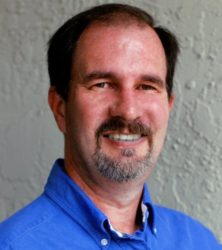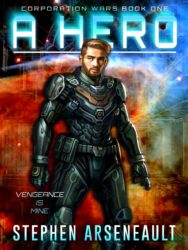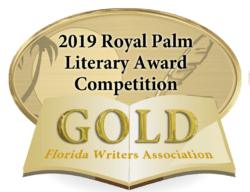
As an engineer, Stephen is accustomed to focusing on all the smaller parts that come together to make a cohesive whole. In 2011, he applied this skill to a newfound love, writing. Stephen started with a few scenes that grew into a novella, then came more writing, feedback, more knowledge, more, more, more until…he sold 7,000 books in one month. One of his books, A Hero, took home the Gold Award for Science Fiction in the 2019 Royal Palm Literary Awards. Stephen talks about beginning small, determination, and author evolution on this week’s RPLA showcase.
Stephen’s Writing Journey
My wife works from a home office and is often in that office during weekday evenings, writing up reports. Being bored with evening TV, and wanting to spend more time with her, I set up my computer at a desk behind hers and facing away. I wasn’t looking to interact as she was busy, but I wanted to share time together. That is where my writing journey began. That was 2011.
I always thought it would be fun to tell a story, but I had no idea how to do it. A few years earlier, I took the time to write a few action scenes, which left my coworkers underwhelmed, so I put the scenes aside. I had no training nor experience with writing, and my college efforts were limited to typing up a single business letter. When getting an applied engineering degree, being able to write was not a required skill, nor a concern. And in grade school, English was by far my least favorite subject. So, I began this journey from scratch.
Once in the office and attempting to write, I imagined I was sitting in my backyard when a sleek, black fighter craft dropped from the sky down to the treetops before turning toward me and rocketing over my head. From that visual, my first book was born.
As a beginning writer, I was unskilled in grammar, punctuation, and even organization. I knew nothing of plots, nor hooks, nor character development. And I had no friends who were writers. My lack of experience and training stacked the odds of success against me, but I began my journey, anyway. It was something to do.
As a reader, I have read and finished about five novels during my adult life. I have an attention issue where after about three pages of reading, my mind wanders, which causes me to reread the same sentence ten times over. As a result, reading holds little joy for me. The stories I read were fantastic, but it took me months to get through them. Strangely though, I can read and edit one of my own in two days.
If there is one thing you can say about me, it’s that I am determined. When I begin a project, I want to see it finished. So, I sat down and began to write with this single direction in my head—what could happen next, and after that, again—what could happen next. The stories didn’t flow out at first, and I had no idea where they were going or where they would end, but I kept writing.
After four months or so of adding to my first work, I had about 30,000 words written. It was a mess. And I knew nothing about editing. But logic told me to go back in and fix it. I hacked out scenes and added in new ones. It was better, although still lacking in almost every way, and about as far from professional as it could be. The one thing I had accomplished though, was that there was a story there, and I fully enjoyed the creative process of bringing it about. So, I continued to edit and add for another few months until I reached about 40,000 words.
I then showed it to family. They thought parts were interesting, but their main reaction was to want to rename it, or to change what was being told, or to give me ideas of what they thought I should write about instead. I assumed that meant it needed more edits. So, I ran through it several more times. Again, I had no idea of what I was doing or how to best do it, but I knew I was now having fun.
This is when I discovered lulu.com and that for free you could create an account, upload a formatted pdf file of your book, and upload a cover. Not only was my book now online and for sale, but I could order a single paperback copy and have it printed and shipped to my house. I had my first paperback in my hands for less than $10! I was instantly hooked on writing. I had sold nothing, but physically holding my own work gave an incredible feeling of accomplishment.
Next, through browsing the web, I discovered Amazon and eBooks. Again, I created a free account, uploaded my book and cover, and there it was for sale on Amazon. Spectacular! I think I sold four eBooks over the next six months at 99 cents each. People actually paid for my work! Humongous! And it wasn’t even enough to get paid. At the time, you had to earn at least $10 in royalties before Amazon would send you a check. So, I wrote a prequel, and then turned the story into a series. Grand!
By mid 2013, the six-book series was selling 10-15 eBook copies per month. Pizza money! But I was enjoying my hobby. I joined a writer’s group, and I took the lessons learned from the first works, along with some great advice from more experienced writers, and began a new series. Surprisingly, my handful of readers really liked the new series, so, with each release, my readership grew. By December 2013, I posted the fourth book in the second series, and sold over a thousand copies of my combined works for the month. Hoozah! Then January saw two thousand sales, then four thousand, and with the help of a Bookbub ad, in one month, I sold over seven thousand eBooks for close to $20,000 in royalties. Crazy!
Since then, I’ve released 77 titles and sold over 200,000 eBooks… all from a journey I never expected nor sought. And over the first three years of that journey, other than my time, I had only spent $10—for that single paperback of my first book. Everything else I did myself. I learned to create covers, did editing, proofing, formatting, managed my catalog, marketed… everything. Why by myself? Because I’m an engineer and I’m cheap and stubborn! Now though, I have others doing much of that, because with experience comes wisdom.
So, if you ever wanted to write, you don’t need experience, or training, or even financing (although each of those helps to give you a huge head start). You just need an imagination, determination, perseverance, and the willingness to learn. But be forewarned. Writing is a disease. Once you begin, you won’t want to stop. I will probably write until they etch my epitaph on my tombstone. “Here lies a god of worlds, a life-giver and life-taker of entire species. His consciousness has passed to a new realm, but his creations will live on in this one… for so long as it exists.”
The Winning Entry, A Hero 
Logline: A hostile alien species becomes the scourge of humanity with the invasion of human space. Our military hasn’t fought a war in centuries. Politics pervades our failing response.
My inspiration was to tell a story where a common man, through unforeseen events and experiences, is elevated to a position of hero and leader. I love having a character who fights the good fight, who is faced with nearly impossible odds and yet finds a way to overcome those odds. The hero story has been told a million times, so I always resolve to tell it in a unique way.
Togmal warriors lay scattered and dead in the surrounding hallway. Their reptilian hearts no longer beat. Their scaly, gray bodies simmered and smoked. The putrid smell of charred flesh fouled the air. I stumbled, wanting to gag. Even after decades of fighting, it was a stench I could never get used to. I paused and steadied myself before reaching up to rub my burning eyes.
Plasma bolts streaked by blue and erupted as orange on impact. Wave after wave of shock reverberated through my body. It felt like I was running a gauntlet through a gathering of boxers. The constant pounding was unforgiving.
Acrid smoke swirled. Damaged corridor lights flickered. The bright yellow walls, once intended to keep inhabitants happy, now resembled a furnace. I could almost feel the heat.
This award comes from fellow writers. It’s always a good feeling to be validated by your peers.
“Dear Me,” (Advice to My Younger Writing Self)
Wow. Where to begin…
To start, you have to enjoy the creative process. If you approach it like it’s work, the product of that effort will read as such. Write about what you like, what interests you. Have fun, put in emotions and feelings. Take the reader to your world and show them why they don’t want to leave. The best compliment to me is when a reader says they didn’t want to put the book down.
Next, be prepared for a life of evolution when it comes to writing skill and knowledge. It’s only the rare author who has the natural ability to craft a great story from the beginning, the rest of us have to learn as we go. The internet is a huge resource. Don’t be shy to ask for help. Be prepared to take all the advice given with the expectation of having to sort through it, keeping the good and tossing the bad. And keep in mind, not every piece of advice works for everyone. Evaluate it and make use of it if it makes sense for your situation. No amount of education or training will make you a good writer. It can certainly help, but is no guarantee. Excellence happens through writing itself, learning from editors and readers what works and what doesn’t.
Thirdly, accept that not everyone wants to read everything you write. Some failure is imminent. Be prepared to have your works mocked or chided by some. Don’t let them bring you down. Take that negative feedback and use it to motivate yourself to do better, to push yourself forward to success, to reach your intended crowd. And always know you can never know everything. There are plenty of hucksters out there looking to profit from your inexperience. Find yourself a few good writing groups and pay special attention to what the more successful writers are saying. They aren’t always right, but they often are.
Writing is an evolution and the journey does not follow a straight line.
Learn More about Stephen
Links to the 77 works of Stephen Arseneault can be found at https://www.arsenex.com
You can also connect with Stephen on Facebook at https://www.facebook.com/stephenarseneault10
More about RPLA
The Royal Palm Literary Awards competition is a service of the Florida Writers Association established to recognize excellence in members’ published and unpublished works while providing objective and constructive written assessments for all entrants. Judges include literary agents, publishers, film producers, current or retired professors, teachers, librarians, editors, bestselling and award-winning authors, and journalists from across the nation. Entries are scored against the criteria set by RPLA using rubrics tailored to each genre. Winners are announced at the annual FWA conference during the RPLA awards banquet. The 2020 guidelines will be posted in January.


Beda Kantarjian
Wow! Stephen Arsenault’s story is amazing–and surely one of a kind. Thank you for posting. I love your RPLA winner stories.
Honorata Nora Czarny
Thanks for sharing. How you discovered ideas to write a novel. Your journey to write the novels is inspirational. Your books are imaginative. Your a star 5 quality. I see you at Rik Feeney meetings.